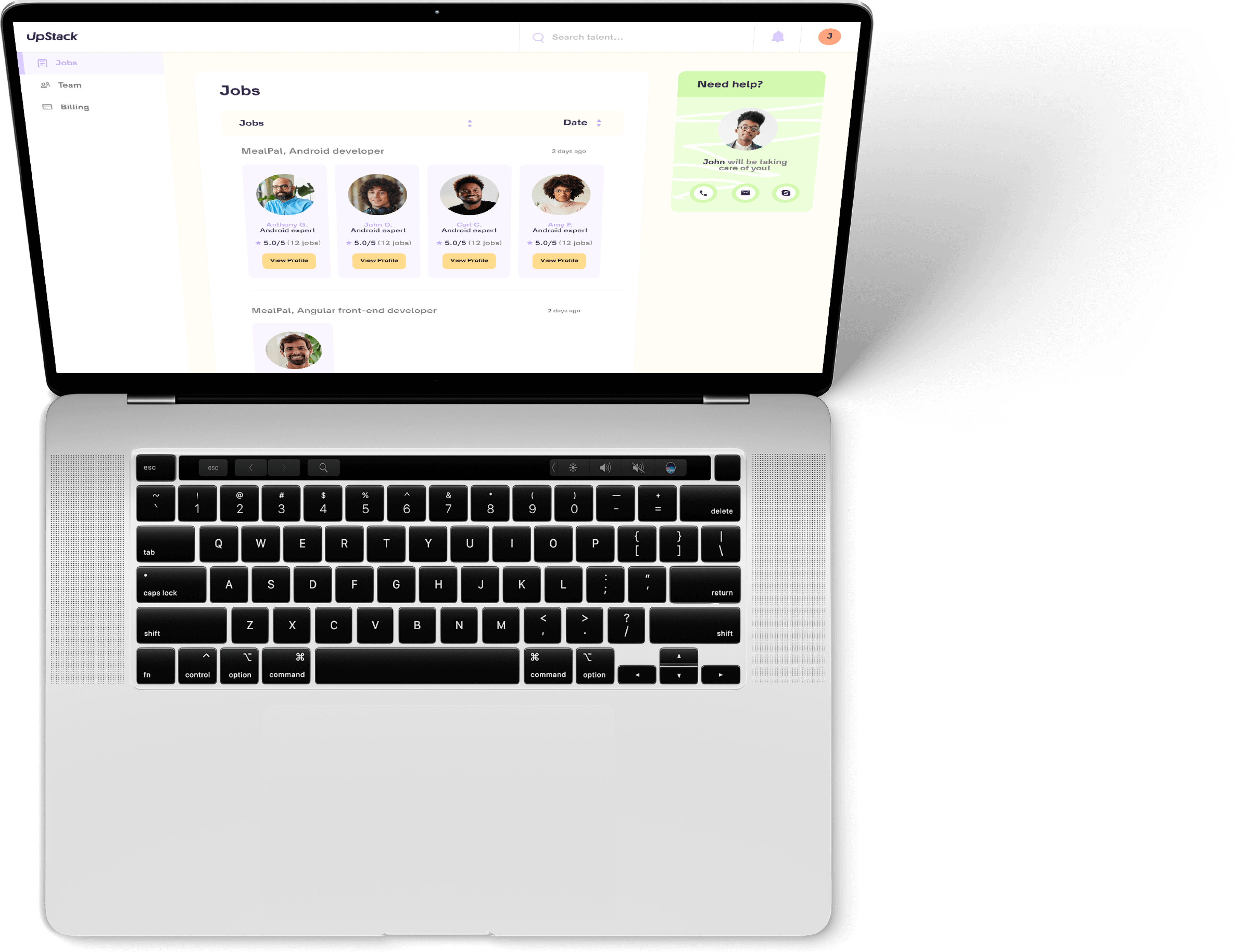


Schedule a consultation and Hire a IoT Developer
Stella B.
Available
IoT Developer
-
Experienced IoT engineer with seamless project implementation
-
Loves guacamole & hates spoilers

-
Marcus T.
Available
IoT Engineer
-
Stacked portfolio of beautiful, functional websites
-
Known for his epic charcuterie & cheese boards

-
David M.
Available
IoT Developer
-
Mobile engineering guru with a knack for translating stakeholder needs
-
Would rather be diving Palau’s Blue Corner

-
Top UpStack IoT Developers
Hire IoT Developers with Upstack
As the Internet of Things (IoT) continue to grow in popularity, so does the demand for experienced and trustworthy developers to create and maintain IoT systems. When it comes to hiring an IoT developer, there are a few key things to consider. An IoT programmer needs to have strong technical skills, understand the complexities of developing IoT applications, and be able to work with a wide range of hardware and software. Additionally, they should have a good eye for detail and be able to think critically to solve problems. In this article, we will provide tips and tricks to help you find the right IoT developer for your project.
What is an IoT developer?
An Internet of Things developer is a programmer who specializes in the development of IoT systems. In other words – they build applications to connect your devices and sensors to the internet. Depending on the project, they might also be responsible for integrating backend applications and databases with their apps. While there is no formal education or certification required to become an IoT developer, there are a few skills that every IoT developer should have. They should have a strong technical knowledge and be proficient in multiple programming languages. Additionally, they should understand the complexities of developing IoT applications and be able to work with a wide range of hardware.
What to look for when hiring an IoT developer
There are a few key things to consider when hiring an IoT developer. First, you need to make sure they have the necessary technical skills and experience to build your IoT application. Second, you need to make sure they understand the complexities of developing IoT systems and the various hardware and software involved. Finally, you need to make sure they are detail-oriented, can think critically, and are able to solve problems when they arise.
A. Technical skills
Depending on the complexity of your IoT system, you may require a developer with various technical skills. In general, you should expect to find developers with proficiency in programming languages, such as Java, C++, Python, or C#. Other technical skills that may be required, depending on the project, include hardware programming, software architecture, database management, debugging, testing, debugging, and project management.
B. Understanding of IoT complexities
Depending on the type of project you are building, you may require a developer with a certain level of IoT knowledge. IoT solutions vary greatly and require a wide range of hardware and software. IoT solutions can range from a simple temperature monitoring system to a complex supply chain tracking system. Thus, you need to make sure that the developer you hire has the necessary IoT knowledge to build your application. You may ask them how they would solve a typical IoT problem, or what hardware and software they would use in a specific IoT scenario.
C. Knowledge of hardware and software
Depending on the type of IoT project you are building, you may require a developer with specific hardware and software knowledge. For example, a project that uses a microcontroller board, such as Arduino, would require a developer with knowledge of microcontrollers and protocols. Similarly, a project that uses a specific type of cloud service, such as Amazon Web Services (AWS), would require a developer with knowledge of that service and how to integrate it with their application.
D. Detail-oriented
An IoT developer should be detail-oriented and able to pay close attention to the small details of a project. For example, they should be able to notice a small code error or a misplaced wire or sensor. They should be able to identify and solve the problem quickly, before it becomes a major issue. This is especially important when developing an IoT system that has to work in an integrated environment, connecting with other systems.
E. Problem-solving ability
An IoT developer should be able to find solutions to problems as they arise and be able to learn from their mistakes. For example, if the system does not work as intended, the developer should be able to identify the issue and resolve it as quickly as possible.
Tips and tricks for finding the right IoT developer
Before you begin your search for the right IoT developer, you should have a clear idea of your project objectives and requirements. For example, what hardware and software you intend to use and what is the desired functionality of the system. You should also have a clear idea of the project timeline, with as many milestones as possible. This will make it easier to find the right candidate who can deliver the project on time. To increase your chances of finding the right candidate, you can focus your search on a specific skill set with a detailed job description.
Advantages of using an IoT programmer
When building an IoT system, you may require various skills, such as programming, hardware expertise, and project management. Hiring a dedicated IoT developer provides you with the flexibility to outsource each part of the project to the most appropriate team member. For example, you can outsource the programming part of the project to an expert programmer, the hardware expertise to an engineer, and the project management to a project manager. This allows you to focus on your core areas of expertise and save time and money on hiring multiple team members.
Questions to ask an IoT developer
When interviewing a potential IoT programmer, you should ask them specific questions related to the project. Ask them how they would solve a typical IoT problem, or what hardware and software they would use in a specific IoT scenario. You should also ask them about their experience with IoT projects, as well as their general technical skills and experience.
They trust Our Internet of Things Developers
Why hire an IoT developer with Upstack
![IoT Developer and Programmer Icon]()
Top IoT talent pre-vetted for a perfect fit.
Our 8-point assessment evaluation ensures that every senior IoT developer you interview exceeds expectations across technical, cultural, and language criteria.
![IoT Programmers Computer Icon]()
Hire reliable, passionate IoT developers.
From late-night sprints to jumping on a last-minute face-to-face, we ensure that your recruits are down to get the job done right.
![IoT Programmers High Five Icon]()
Risk-free 14-day trial.
Confidently onboard candidates with our no-questions-asked trial period. We’ll walk you through the contract-to-hire process if and when you’re ready to make it permanent with your new IoT engineer.
![IoT Computer Programmer Icon]()
Our Client Success Experts provide white-glove service.
Stay laser-focused on your business goals while our team of experts curates potential candidates and manages seamless programmer onboarding.
![IoT Developer Writing Notes Icon]()
Build your optimal team confidently, quickly.
UpStack handles everything including background and reference checks, legal issues, and more. Our platform streamlines billing, timesheets, and payment all in one easy-to-access place.
Schedule a call with a Client Success Expert to get starting hiring a IoT developer.
Start hiring Start hiring Start hiring
Hire from the Best.
Working with our Client Success Experts, we’ll help you build the remote team of your dreams with top IoT talent from around the world.
Pre-vetted, reliable Internet of Things developers are standing by.





Hiring IoT Developers | FAQs
How much does it cost to hire a IoT developer?
UpStack has a simple billing model where each IoT developer has a standard hourly rate averaging between $65-$75 per hour. Rates are based on skills, knowledge, and experience, and our developers are available mainly for full-time engagement (40 hours per week) and the occasional part-time opportunity (20 hours per week).
What is the process to find a IoT developer?
You’ll connect with an UpStack Client Success Manager to determine your immediate needs. Our team uses a combination of AI and personal assessment to short-list candidates that match your job requirements. From there, you interview, select, and onboard the perfect developer, all within days of your initial call.
How does UpStack find its IoT developers?
UpStack’s talent recruitment team connects with software developers around the globe every day. Each IoT programmer is vetted for technical, communication, and other soft skills necessary for a developer to successfully work with your team. Once vetted, the candidates are accepted into the UpStack developer community.
How is UpStack different from an agency or recruiter?
UpStack's community of available, pre-vetted engineering talent means minimizing roadblocks to scaling your team effectively, efficiently, and immediately. Our Client Success Experts work with you and your UpStack developer to ensure a smooth and seamless engagement.
Can I hire UpStack IoT developers directly?
Yes, you can hire UpStack IoT developers at any time, and with the same assurance of smoothly on boarding talent risk-free. First, we’d create a job opening on our portal. Then, we’d vet, interview, and match developers that meet your needs. If you’re satisfied at the end of the 14-day trial period, at any time you can directly hire them.
Common Iot (Internet of Things) Questions
What is IoT Application Development?
IoT (Internet of Things) application development refers to the process of creating software applications that run on devices connected to the Internet of Things. The Internet of Things, or IoT, refers to the network of physical objects (devices, vehicles, equipment, etc.) that are embedded with sensors, software, and other technologies that enable them to collect and exchange data. IoT application development involves creating the software that runs on these devices, as well as the back-end systems and infrastructure that support them. This can include creating applications that control and monitor devices, collect and analyze data from them, and integrate with other systems and services. IoT application development often involves working with a range of technologies, including sensors, microcontrollers, communication protocols, and cloud-based services.
How Do I Develop an IoT Application?
Here are some steps you can follow to develop an IoT application:
- Start by defining the problem you want to solve with your IoT application. This will help you determine the key features and capabilities of your application.
- Choose the appropriate hardware and technology stack for your IoT application. This will depend on the specific requirements of your application, such as the type of devices you need to support, the communication protocols you need to use, and the data you need to collect and process.
- Design the architecture of your IoT application, including the back-end systems and infrastructure that will support it. This might involve creating a cloud-based platform for managing and processing data, as well as designing the communication and integration between the different components of your application.
- Develop the software that will run on your IoT devices, as well as the back-end systems and infrastructure that support them. This might involve writing code to control and monitor devices, collect and process data, and integrate with other systems and services.
- Test and debug your IoT application to ensure that it is working correctly and meeting your requirements. This might involve testing the application on a small scale, or using simulation tools to test the different components of the system.
- Deploy your IoT application, including deploying the software to your devices and setting up the back-end systems and infrastructure. This will typically involve rolling out the application in stages, and monitoring and maintaining the system once it is live.
Remember that developing an IoT application can be a complex process, and will likely require expertise in a range of areas, including hardware, software, networking, and data analysis. It is important to carefully plan and manage the development process to ensure that your application meets your requirements and is successful.
Can I Develop an App with IoT?
Yes, you can develop an app with IoT. IoT, or the Internet of Things, refers to the network of physical objects (devices, vehicles, equipment, etc.) that are embedded with sensors, software, and other technologies that enable them to collect and exchange data. By incorporating IoT technologies into your app, you can create an app that can interact with and control these devices, collect and analyze data from them, and integrate with other systems and services. For example, you could create a mobile app that allows users to monitor and control their home security system, a fitness app that tracks and analyzes data from wearable devices, or an app that helps businesses manage and optimize their supply chain. To develop an app with IoT, you will need to have a good understanding of IoT technologies and how to integrate them into your app. You will also need to have the necessary hardware and infrastructure in place to support your app and the connected devices.
What are IoT Challenges?
There are several challenges associated with the Internet of Things (IoT), including the following:
- Security and privacy concerns: As more devices are connected to the Internet, there is an increased risk of security breaches and data leaks. Ensuring the security and privacy of data collected and transmitted by IoT devices can be difficult, and requires the use of strong encryption and other security measures.
- Interoperability and standardization: With so many different types of IoT devices and systems, it can be difficult for them to work together seamlessly. This can lead to compatibility issues and limitations on the types of applications and services that can be built with IoT. Developing standards and protocols for IoT can help address this problem, but achieving widespread adoption of these standards can be challenging.
- Scalability: As the number of IoT devices grows, the amount of data generated by these devices can become overwhelming. This can put a strain on the infrastructure and systems that support IoT, and can make it difficult to manage and analyze the data in a meaningful way. Ensuring that IoT systems are scalable and can handle large amounts of data is a major challenge.
- Power and connectivity: Many IoT devices are small and portable, and may not have access to a consistent source of power. This can make it difficult to keep these devices connected and functioning, and can limit the types of applications and services that can be built with IoT. Finding ways to power and connect IoT devices in a reliable and efficient manner is an ongoing challenge.
Overall, the challenges associated with IoT are complex and multifaceted, and require the collaboration and expertise of many different stakeholders. Addressing these challenges will be essential for realizing the full potential of IoT and enabling the development of innovative and effective applications and services.















